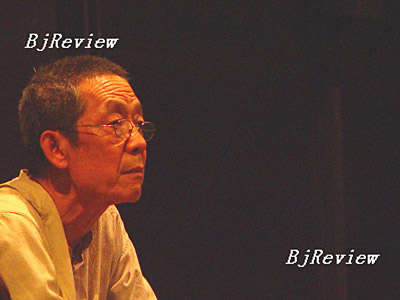 |
|
Lin Zhaohua (CHEN RAN) |
Moments after the curtains came down on the world premiere of Poet Li Bai, a Chinese opera directed by renowned Chinese mainland theatre director Lin Zhaohua, the sold-out Central City Opera House of Colorado State rang with resounding applause that continued for over five minutes. The opera, according to The Denver Post, was "a total success" and marked "another major step forward for the burgeoning Chinese classical-music world". After its first six performances in Denver, starting with its premiere on July 7, 2007, the opera is now scheduled to go on tour to Beijing and Shanghai in October.
Between rehearsals of his new play The Assassin, Director Lin Zhaohua of the Beijing People's Art Theatre shares his views on Poet Li Bai and Chinese theatre, in an exclusive interview with Beijing Review.
Beijing Review: Your staging of Poet Li Bai, as The Denver Post says, "is stylized and ritualistic" and "draws on elements of Asian theater". How do you perceive this opera? What do you think are the key elements required for you to be recognized by a Western audience with an opera tradition, given that this libretto features a poet in ancient China credited with the creation of more than 1,000 beloved poems?
Lin Zhaohua: To be honest, I don't think it is proper for me to comment on operas or plays I've directed. Personally, I don't really like opera and the way that European opera presents itself. Besides, I don't have too much experience on opera directing. Poet Li Bai is the third opera I have directed, following The Banquet and The Diary of A Madman. All of them are the masterpieces of composer Guo Wenjing.
The opera, with a libretto in Chinese as you mentioned, is based on the life of poet Li Bai (701-762 A.D.) of the Tang dynasty, who has been honored as a Poet Immortal in China. We wanted to showcase a brand-new way of performing and staging that featured a unique Chinese style, rather than the traditional European one. For example, we often use traditional Chinese musical instruments, such as the bamboo flute, gong and drum, etc. during the opera.
The success of an opera rests on the music, which also determines the style. In other words, it is the composer rather than the director who plays a key role in an opera. The music of Poet Li Bai by Guo Wenjing is perfect, and combines classical elements with modern arts. What I did as a director was only auxiliary.
Are you confident that the play will perform well in Beijing and Shanghai in October, considering the audiences in these cities are the most enthusiastic, as well as critical, when it comes to theatre?
I have no idea what the audience response will be. Indeed, the only thing worth bearing in mind is we've tried our best to present the character and the motion of the opera, and it is neither the American nor the Chinese audience that this opera is specifically aimed at.
Comparisons between Poet Li Bai and The First Emperor are inevitable, the latter being the cooperative effort of composer Tan Dun and director Zhang Yimou. There were quite a few negative comments from the local media after The First Emperor premiere at the New York Metropolis Opera House in December last year. What is your opinion of the ways Tan and Zhang have attempted to make the East and the West more compatible? I've noticed that Tan Dun is also the composer of your new play The Assassin.
I'm sorry that I haven't seen The First Emperor, so I can't comment on it. But there is something that needs to be clarified: the comparison between Poet Li Bai and The First Emperor is somehow unfair, because the New York Metropolis Opera House enjoys a higher reputation than the Denver Central City Opera House.
Actually, I have little knowledge of the efforts that Tan and Zhang have made towards the fusion of Eastern and Western cultures. Besides, I haven't seen the operas composed by Tan Dun before, so I'm afraid that I can't comment.
| 
